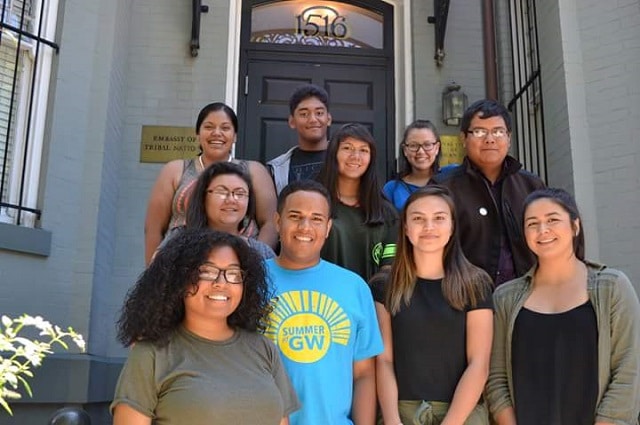
I initially heard about the Native American Political Leadership Program’s INSPIRE Pre-College Summer Program during the summer between eighth and ninth grades. I applied the following summer, only to find out that they were accepting rising seniors and recent high-school graduates, so I committed the program to memory and applied in the winter of my junior year at Tecumseh High School.
I received an email congratulating me on my acceptance from a pool of hundreds of applicants and my INSPIRE experience began. I entered the program expecting to just learn the basics of how tribal governments interact with the federal government. However, after three weeks in our nation’s capital, I walked away with a completely different view of Native Americans and Indian Country’s effect on the modern political system.
The program teaches Native students how to adapt to both a collegiate and metropolitan climate. There was no “wake-up time” or “lights-out,” only advice such as “be mature enough to make your own decisions in Washington D.C.”
My day began at 8:15 a.m. when I would dress, walk to breakfast and report to class by 9 a.m. Our class covered a wide variety of subjects from political entrenchment and social change, successful campaigning procedures, tribal sovereignty and examinations of Indian Health Services.
For lunch, we were allowed at all of the restaurants at the George Washington University campus, so there were plenty of options for me and the other nine members of my cohort. Following lunch, we would head to our afternoon meetings.
While in D.C., we had the opportunity to meet with organizations such as: the Administration for Native Americans, the Chickasaw Nation of Oklahoma, the National Indian Gaming Association, the Navajo Nation, the National Indian Health Board and the Center for Native American Youth just to name a few. We also had the opportunity to meet the Director of the Bureau of Indian Affairs Michael Black; Public Affairs Director for the Assistant Secretary of Indian Affairs (and a fellow Potawatomi) Nedra Darling; Oklahoma Representative Tom Cole; and the special assistant to the President for Native American Affairs, Karen Diver.
After completing our afternoon meetings, we had the rest of the day to ourselves when we could explore, have fun, or work on our projects that were due at the end of the program. My fellow cohort members and I had to quickly learn to prioritize our school work and to have an open line of communication with our residential assistants at all times. The program’s coursework was very challenging; however, they provided us many opportunities to enjoy D.C. too. We were able to visit museums, tour the Department of the Interior, witness the Fourth of July celebration on the U.S. Capitol lawn, watch the sunrise from the National Mall and even got to bowl in the White House!
At the end of the program, each cohort member had to make a presentation representing an issue faced by their local community. After evaluating my surroundings and receiving guidance from CPN Vice-Chairman Linda Capps, I was able to inform my peers of the taxation issue facing the Citizen Potawatomi Nation and the City of Shawnee.
The opportunity that the INSPIRE Program offers was truly a once-in-a-lifetime experience that God blessed me to be a part of, and I highly recommend that all Potawatomi youth look into participating in this three-week pre-college program. I look forward to sharing my newfound knowledge with my peers, our tribal leadership and applying what I have learned to my possible future political career.
To learn more about the INSPIRE Native Teams Initiative, please visit http://cpn.news/InspireCollege.
